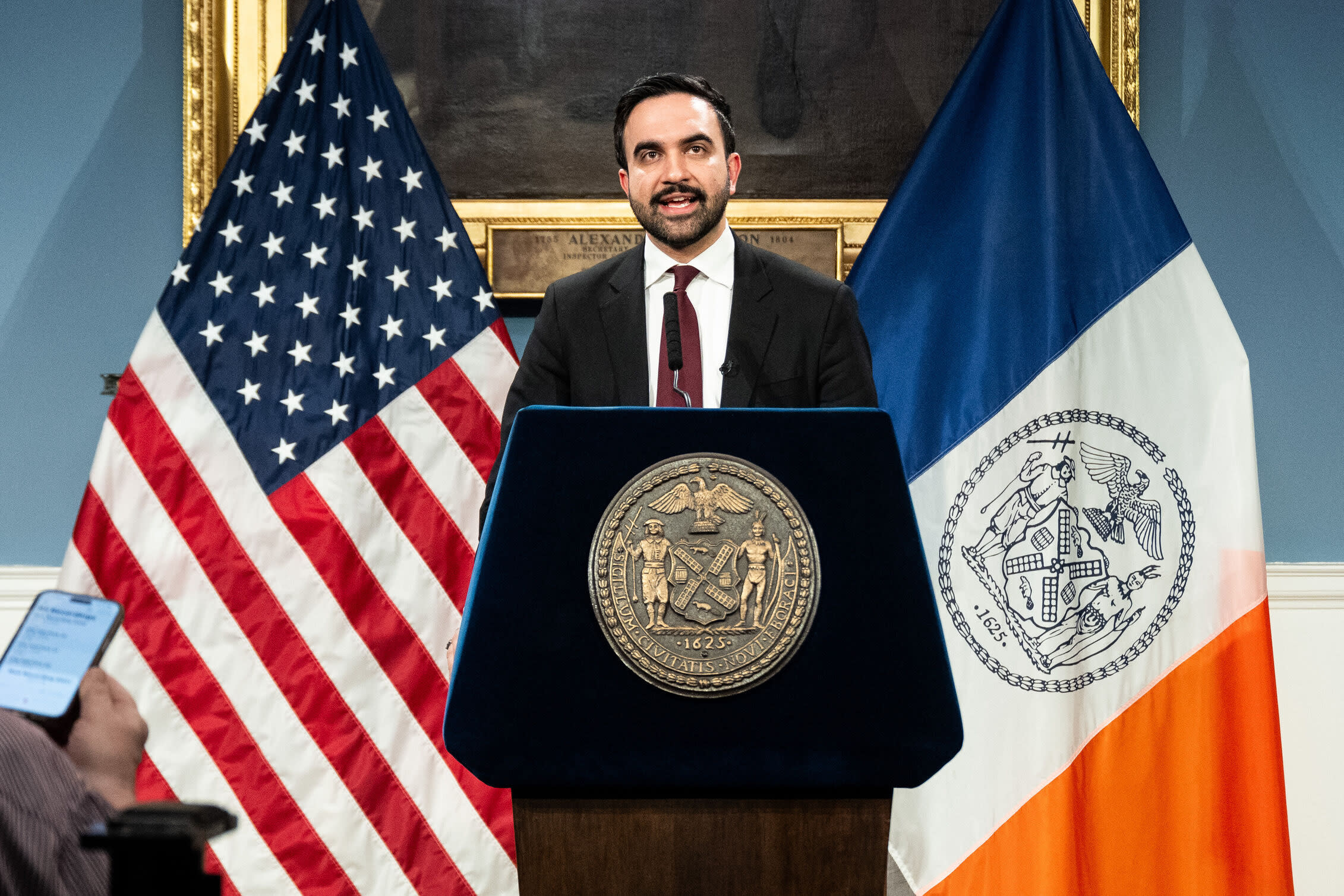Bloomberg would pay $3 billion less under his wealth tax than under Sanders plan
Democratic presidential candidate Mike Bloomberg says he would pay more to Uncle Sam under his plan to raise taxes on wealthy Americans. What the former New York City mayor hasn't said: He'd pay as much as $3.5 billion less under his wealth tax than he would under similar proposals from Senators Bernie Sanders and Elizabeth Warren, two of his rivals for the party's nomination. Bloomberg's plan would also generate far less government revenue.
Bloomberg, who released his tax plan last week, said the proposal targets the "very rich." That includes him: Bloomberg is worth an estimated $61 billion, according to Forbes.
Much of that fortune is tied to Bloomberg LLC, the global financial data and media empire he founded four decades ago. The candidate owns 88% of the company, which generated an estimated $3.8 billion in income last year alone, according to industry consultant Douglas Taylor. And his nearly 90% ownership stake in the media enterprise entitled him to about $3.3 billion of that income stream.
Bloomberg would certainly pay significantly more in taxes under his tax proposals than what he is paying under the current tax code. But that's not unique. All of the major Democratic presidential candidates are proposing tax plans that would raise taxes on the wealthy.
What's more, even outside his proposed wealth tax, Bloomberg's broader tax plan could save him and his company millions versus what he would pay under plans proposed by his rivals. For instance, Bloomberg would raise the corporate tax rate to 28% from a current 21%, but not all the way back to the 35% where it was before President Donald Trump and congressional Republicans lowered it in late 2017. (Rivals like Pete Buttigieg, Sanders and Warren would like to roll back Mr. Trump's corporate tax cut completely.) That 2017 corporate-rate change saved Bloomberg's company roughly $550 million last year.
Bloomberg's campaign declined to comment on what he would personally pay under his tax plan or that of other candidates.
"We don't have nor discuss Mike's personal financials," a Bloomberg campaign spokesperson said. "Mike is in the highest tax bracket now, and he would be in the highest tax bracket under the plan he released."
The Bloomberg campaign also hasn't released a detailed explanation of his tax plan, while independent tax experts have yet to evaluate it. Here's a breakdown of what we currently know — and don't know — about Bloomberg's wealth tax proposal and how it compares to what other Democratic candidates have proposed, including Sanders and Warren as well as Joe Biden, Pete Buttigieg and Amy Klobuchar.
Bloomberg plan
How much more Bloomberg would pay under his proposed wealth tax: $1.2 billion per year, compared to his current tax bill.
How it would work: A key in understanding Bloomberg's plan to tax the rich is that it isn't really a "wealth tax" — it's simply an income tax. That means it would be easier to administer than a wealth tax.
"Bloomberg's wealth tax is an incremental change, and that's an advantage because it won't require the construction of a new administration of the IRS to put in place," said Janet Holtzblatt, a senior fellow at the Urban-Brookings Tax Policy Center. "But it will also create a lot less new tax liability for the wealthy."
Currently, the top tax rate for all income over $500,000 is 37%. Bloomberg's proposal adds a new tax of 5% on incomes over $5 million a year. He calls that a new surtax on high incomes, but it's essentially just adding a higher tax bracket.
Bloomberg also plans to raise that base rate — before the surcharge — for income above $500,000 to 39.6%, which is what it was under President Barack Obama. That would bring the highest income tax rate under Bloomberg's plan to 44.6%. That's still less than Sanders's top proposed income rate of 52%, but more than what the other campaigns are proposing.
How many people would pay Bloomberg's wealth surcharge: Income taxes generally hit a larger portion of the population than wealth taxes. But that might not be true for Bloomberg's wealth surcharge, even though it is structured as an income tax.
Roughly 11,000 Americans earned at least $5 million in 2017, according to the latest available statistics from the Social Security Administration. Include investment income from things like gains on stock sales or flipping houses, and many more people would pay Bloomberg's wealth surcharge — it just isn't clear how many.
As of 2017, there were 143,000 tax fillings that reported income of $2.4 million or more, and 14,300 with that nearly $13 million or more. So the number is likely somewhere between those two.
How much government revenue it would raise: Bloomberg's tax proposals would generate a total of $5 trillion in new government revenue over a decade, according to his campaign. But that is for all of his proposals — not just the wealth tax.
Based on earned income alone, Bloomberg's surcharge targeting the rich wouldn't raise much, maybe around $4 billion a year, or $40 billion over a decade. Consider all forms of income, however, and the potential haul could be roughly $1.8 trillion over a decade, based on the University of Pennsylvania's Penn Wharton Budget Model estimate of $200 billion a year from just raising the capital gains tax to 42% (slightly less than the 44.6% top rate that Bloomberg is proposing). About $140 billion of that would come from the top 1% of all earners.
Sanders plan
How much more Bloomberg would pay under Sanders's proposed wealth tax: $4.7 billion.
How it would work: Sanders's plan is a true wealth tax. After that, it gets complicated.
Sanders is proposing eight wealth tax brackets that start at 1% for couples with wealth above $32 million, and goes up to 8% for wealth above $10 billion. Tax thresholds are cut in half for individuals, who would start paying his 1% wealth tax at $16 million.
The advantage of a wealth tax is that it taxes all types of assets, not just income. For instance, it would capture those who have inherited their fortune or got to eight figures from investments.
The disadvantage is that the government would have to create a whole new system to asses wealth — including real estate and private business ownership — and then tax it. That wouldn't be cheap. And many experts say it's even easier for rich people to avoid a wealth tax than an income tax as they can shelter much of theIr wealth overseas.
How many people would pay the wealth tax: The Sanders wealth tax would likely affect more Americans than those who would pay Bloomberg's surcharge. The Sanders tax would be paid by the 180,000 wealthiest American families, according to his campaign and an independent assessment from economists and income-inequality experts Emmanuel Saez and Gabriel Zucman. That's about 40,000 more households than Bloomberg's wealth tax.
How much government revenue it would raise: The Sanders campaign says $4.4 trillion over a decade. Penn Wharton's analysis puts the revenue projection at $3.3 trillion, and possibly as low as $2.8 billion if the wealth tax slows the economy.
Warren plan
How much more Bloomberg would pay under Warren's proposed wealth tax: $3.7 billion.
How it would work: Warren's plan, like Sanders, is a direct tax on wealth. But her blueprint is simpler.
There are just two brackets for both couples and individuals: Warren is proposing that millionaires pay a 2% tax on all their wealth above $50 million. Billionaires would pay 6%. That should make administering a wealth tax slightly easier, but still more complicated than just raising income tax rates, as Bloomberg proposes.
How many people would pay: The Warren campaign, as well as economists Saez and Zucman, say her tax plan would affect 70,000 households. But another study by a trio of economists estimated that nearly 300,000 people would have to pay Warren's wealth tax for it to generate the total money Warren says it could.
How much government revenue it would raise: Saez and Zucman peg the expected revenue from her wealth tax at $4 trillion. Penn Wharton estimates it at $2.7 trillion, and $500 billion less, or $2.3 billion, if her wealth taxes slow the economy.
Biden, Buttigieg and Klobuchar
How much more Bloomberg would pay under the other candidates' proposed tax hikes: $1 billion.
How their plans would work: Neither Joe Biden, Pete Buttigieg nor Amy Klobuchar are proposing a designated wealth tax. Of the three, only Klobuchar has said she is "open" to one. Buttigieg called Warren's wealth tax "extreme."
In fact, Biden and Buttigieg are proposing to tax billionaires like Bloomberg less than what the media mogul has outlined. Klobuchar is proposing a 30% minimum alternative tax for those earning more than $1 million a year, but hasn't given many details on how it would work.
Instead, and like Bloomberg, all three want to raise income taxes on the wealthy, mostly by taxing investment gains at the same rate as wages. That would hit the rich more than average Americans who may not participate in the stock market beyond their 401(k)s, IRAs and other pre-tax retirement plans.
The candidates have also proposed returning income tax rates for top earners to where they were before President Trump took office. That would raise the tax on capital gains to 39.6% from its current top rate of 20%.
How many people would pay more tax: The Biden, Buttigieg and Klobuchar plans are by far the broadest because their additional tax revenue would come from raising the capital gains tax on all Americans, not just the super wealthy.
As of 2017, some 1.4 million American households had annual income of more than $500,000. Nearly all of them would likely pay more under the three candidates' plans.
How much government revenue they would raise: Penn Wharton has said Biden's total tax plan can generate $2.6 trillion over a decade. But that includes everything from raising the corporate income tax to eliminating tax breaks for companies that produce fossil fuels. About half of that, or $1.3 trillion, would be raised from top wage earners, according to Penn Wharton's calculations.
The Buttigieg and Klobuchar plans have not been analyzed by an outside group. Neither campaign responded to comment for this article.
Editor's note: CBS MoneyWatch Senior Reporter Stephen Gandel is a former employee of Bloomberg LLC.
Correction: An earlier version of this story said that candidate Mike Bloomberg wanted to maintain the current 21% corporate income tax rate. In fact, the candidate has said he would like to raise it to 28%.



